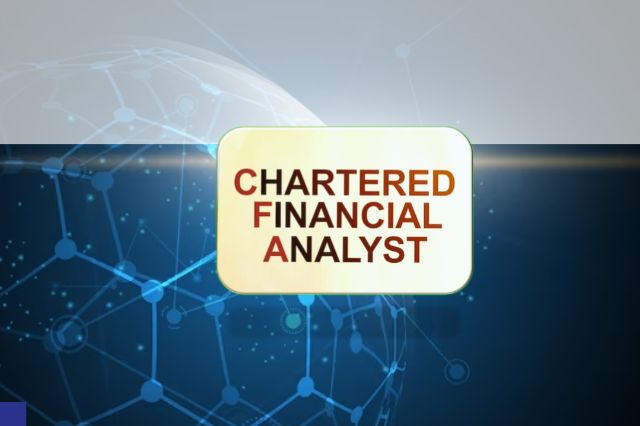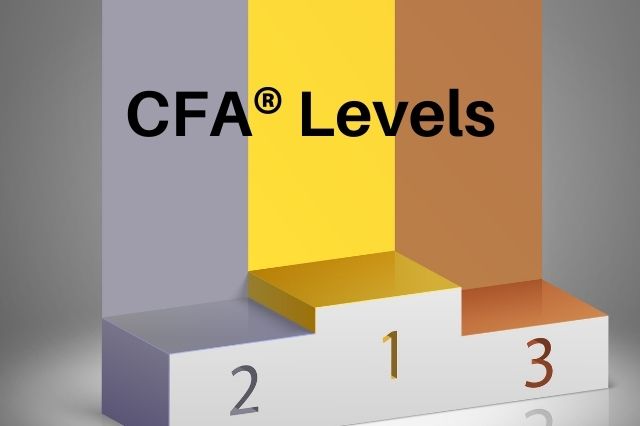
The CFA®️ Designation: A Distinct Symbol of Excellence in the World of Finance
- Categories Finance
- Date December 2, 2023
Welcome to the world of finance, where numbers speak volumes and decisions can make or break fortunes. In this highly competitive and complex industry, having the right skills and knowledge is essential for success. This is where the Chartered Financial Analyst (CFA®️) designation comes in.
Enter the Chartered Financial Analyst (CFA) designation – a testament to excellence in finance. This globally recognized certification not only showcases technical Competence but also emphasizes adherence to the highest ethical standards in the field.
So, what exactly is the CFA designation, and why is it so highly valued in Finance? Let’s find out.
In this blog post, we’ll explore what it means to be a CFA®️ Certification holder, the benefits of obtaining this prestigious designation, and how to become a CFA®️ Charterholder.
Discover what awaits you on your journey to earning this prestigious designation, and learn some valuable study tips along the way.
The CFA®️ designation signifies not just technical expertise but also adherence to the highest ethical standards in the finance industry, fostering trust and credibility.
When it comes to the finance industry, technical expertise is undoubtedly important. But what sets CFAs apart is their unwavering commitment to the highest ethical standards. The CFA designation signifies not just proficiency in financial analysis but also a deep understanding of ethics and professionalism.
Moreover, CFAs understand the importance of acting in their clients’ best interests at all times. They prioritize long-term value creation over short-term gains and strive for fairness in every transaction they engage in.
Introduction to the CFA®️ Certification
Globally, the CFA designation is recognized as a mark of excellence in finance. It stands for Chartered Financial Analyst, In addition to technical expertise, it demonstrates a commitment to ethical conduct.
To become a CFA Charter Holder, individuals must pass a series of rigorous exams that test their knowledge and understanding of financial analysis, ethics, and professionalism. These exams cover a wide range of topics including economics, portfolio management, equity investments, fixed income securities, derivatives,Quantitative Methods,Financial Reporting Analysis, and corporate finance, Alternative Investment and more.
What sets the CFA designation apart is its emphasis on ethical behavior. CFAs are required to adhere to strict codes of conduct that prioritize client interests above all else. This commitment to integrity fosters trust and credibility in an industry that relies heavily on the confidence of clients.
In conclusion,the journey towards becoming a Chartered Financial Analyst requires dedication and hard work,but it offers immense rewards in terms of knowledge enhancement,career prospects,and professional credibility.
If you are considering a career in finance or looking to advance in your current role, the CFA designation is definitely worth pursuing. We will now discuss in detail the benefits of earning the CFA designation and what it takes to become a CFA Charter Holder.
Benefits of becoming a Chartered Financial Analyst (CFA®️)
The benefits of becoming a Chartered Financial Analyst (CFA) are numerous and valuable.
Here are some of the most significant advantages of earning this prestigious designation:
1. Increased Career Opportunities: The CFA designation is globally recognized and respected, opening doors to a wide range of career opportunities in finance. CFAs are highly sought after by employers and can find employment in various roles such as investment banking, portfolio management, research analysis, risk management .
2. Enhanced Knowledge and Skills: The CFA program covers a comprehensive range of topics, providing candidates with a deep understanding of financial analysis, ethics, and professionalism. This knowledge and skillset can be applied in various job roles and industries.
3. Professional Credibility: Earning the CFA designation demonstrates a commitment to ethical behavior and adherence to strict codes of conduct. This fosters trust and credibility among clients, employers, and colleagues, giving CFAs a competitive edge in the finance industry.
4. Higher Salary Potential: With the advanced knowledge and skills gained through the CFA program, individuals can command higher salaries and better job opportunities. According to a survey by the CFA Institute, CFAs earn an average of 54% more than their non-CFA counterparts.
5. Global Recognition: The CFA designation is recognized and respected globally, providing CFAs with opportunities to work in different countries and regions.
6. Continuous Learning: The CFA program requires candidates to maintain their knowledge and skills through ongoing education and professional development. This ensures that CFAs stay up-to-date with the latest trends and developments in the finance industry, making them valuable assets to their employers.
7.Network and Continuing Education: As a CFA Charter Holder, individuals gain access to a global network of finance professionals, opening up opportunities for networking, mentorship, and career advancement.
CFAs possess a deep understanding of financial analysis, ethics, and professionalism. This expertise allows them to provide accurate and reliable insights into investment decisions, making them highly sought after by employers in various sectors such as asset management firms, banks, consulting firms, and hedge funds.
So, we can say that having the CFA designation is a worthwhile investment in one’s career, offering numerous benefits and opportunities for growth and advancement. However, becoming a CFA Charter Holder requires dedication, hard work, and a commitment to ethical behavior. Studies have shown that CFAs earn higher salaries compared to their non-CFA peers due to their specialized skills and knowledge.
In conclusion, Clearing CFA level -1 is a challenge in itself, but the benefits that come with earning the CFA designation make it all worth it RVM finishing school helps aspiring individuals unlock these benefits by providing comprehensive guidance for passing all three levels of the CFA exam successfully. Also, our expert faculty and study materials ensure that students gain a deep understanding of the concepts and are well-prepared for the exams. With RVM Finishing School, you can embark on your journey to becoming a successful Chartered Financial Analyst.
The CFA®️ Exam: What to Expect
It consists of three levels: Level I, Level II, and Level III .Each level has its own exam, and all three exams must be passed sequentially in order to earn the CFA designation. The exams usually requires approximately 300 hours of study time.It is also important to note that the CFA exams are computer-based and are offered in test centers around the world.

Level 1:
This level focuses on the fundamentals of investment tools and concepts, including ethics and professional standards, quantitative methods, economics, financial reporting and analysis, corporate finance, equity investments, fixed income, derivatives, alternative investments, and portfolio management.
The CFA level 1 Exam is offered four times in a year (February, May, August, and November)in 2024.
The CFA Level 1 exam pattern consists of 180 multiple choice questions, split between two 135-minute sessions (session times are approximate). There is an optional break between sessions.
- First session (2 hours, 15 minutes): 90 multiple choice questions, covering the topics of ethics & professional standards, quantitative methods, economics, and financial statement analysis
- Second session (2 hours, 15 minutes): 90 multiple choice questions, covering the topics of corporate issuers, equity, fixed income, derivatives, alternative investments and portfolio management
Also in 2024, CFA institute introduce pre-requistic e-learning which includes completing a series of online tutorial on financial modelling and python . This change is aimed at preparing candidates for the increasing use of technology in the finance industry and to provide a more comprehensive understanding of financial concepts.
It is recommended to prepare for at least 6 months before attempting this level. . Book a free counselling session with Expert Faculty at RVMfs to create a study plan and get tips for effective preparation & guidance related to cfa Level 1 enrollment.
Level 2:
This level builds upon the concepts learned in Level 1 and focuses on asset valuation and application of investment tools and concepts. The topics covered include ethics and professional standards, quantitative methods, economics, financial reporting and analysis, corporate finance. This level focuses on asset valuation and includes both multiple-choice questions and item set questions.It is offered only thrice in a year (May, August, and November in 2024).
Structure: The CFA Level II exam consists of 22 item sets comprised of vignettes with 88 accompanying multiple-choice questions.
Duration: The Level II exam will be 4 hours and 24 minutes, split into two equal sessions of 2 hours and 12 minutes, with an optional break in-between.
RVMfs offers expert training for CFA Level 2, covering all the topics in-depth and providing practice questions and mock exams to help students prepare effectively. Enroll in our CFA Level 2 course and get a step closer to becoming a CFA Charter Holder.
Level 3:
This level focuses on portfolio management and wealth planning. It builds upon the concepts learned in Level 1 and Level 2.
It is also offered only twice in a year (February and August) in 2024
The Level III exam will be 4 hours and 24 minutes, split into two equal sessions of 2 hours and 12 minutes, with an optional break in-between.
CFA®️ Charter require Professional Work Experience of 4,000 hours of relevant work experience in addition to passing all three levels of the CFA exams. This experience can be acquired before, during or after the completion of the exams.
Once all the requirements are met, the candidate can apply for the CFA charter and become a CFA Charter Holder.
RVMfs offers comprehensive study materials and expert guidance to help students pass this level with flying colors. Our faculty also provides personalized support and feedback on essay-type questions, helping students to improve their writing skills and excel in this level.
To successfully navigate through the CFA Exam process, it is important to develop a structured study plan that includes ample practice questions and mock exams.
It is also recommended to take advantage of available study resources and seek guidance from experienced CFA Charter Holders or expert training providers like RVMfs.
With dedication, hard work, and proper guidance, passing the CFA exams and becoming a CFA Charter Holder is achievable.
How to Obtain the CFA® Charter
To obtain the highly esteemed Chartered Financial Analyst (CFA) designation, aspiring finance professionals must go through a rigorous process. Here’s a step-by-step guide on how you can achieve this globally recognized credential.
First and foremost, meet the eligibility requirements set by the CFA®️ Institute.
Next, register for the CFA Program and start studying diligently. The program consists of three levels, each with its own exam that tests your knowledge in areas such as ethics, financial analysis, portfolio management, and economics.
Devote ample time to study and understand the curriculum deeply. It is recommended that candidates spend at least 300 hours preparing for each level of the exam.
Consider joining study groups or enrolling in preparatory courses offered by reputable institutions like RVM Finishing School. The training institutes can provide valuable insights and help you stay focused during your preparation journey.
Once you feel adequately prepared, take each level of the exam when it becomes available.
Passing all three levels of examinations is crucial to obtaining your CFA designation. Each exam requires dedication, discipline, and an ability to apply theoretical concepts to real-world scenarios. It’s essential to manage your time effectively during the exams.
Conclusion
By becoming a Chartered Financial Analyst, individuals open themselves up to a world of career opportunities. Employers across industries value the CFA credential and recognize its significance in assessing an individual’s qualifications for roles such as Invest ment Analyst, Portfolio Manager, and Wealth Advisor,Research Aanalyst, Risk Manager, Financial Advisor, and many more.
Earn your CFA designation now and stand out in today’s highly competitive finance industry. Join thousands of successful CFAs worldwide who have proven their commitment to excellence. Take the first step toward professional growth and recognition today!
For more information, schedule a demo session with RVM Finishing School. Our expert faculty will guide you through the CFA program and help you achieve your goals towards success in the CFA exams.
Request call back by RVM Finishing School: Dial +91- 888 5050 889 or Email : [email protected]
Tag:cfa, cfa level1, cfa prep training
You may also like

August Auto Sale Report

What is Price Earnings Ratio or PE Ratio

